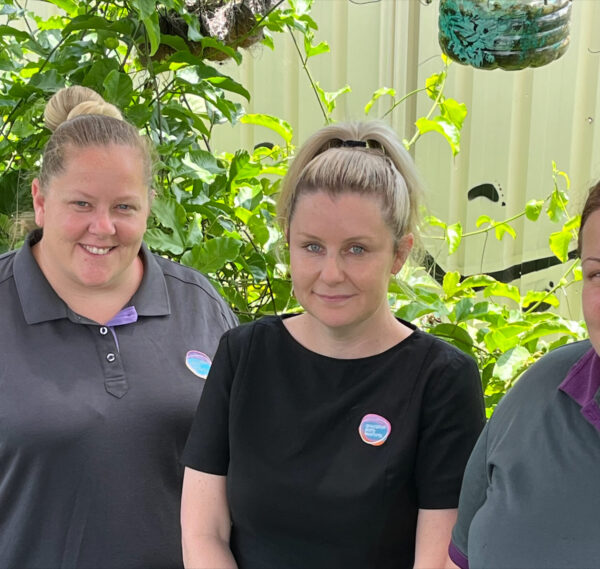Eleni advocates for remote placements as a means to boosting professional growth

Despite being born in Athens, living in France, and embracing a global lifestyle, for early childhood education and care (ECEC) professional Eleni Svarnia (shown left), her richest experiences have come from the little West Australian town of Derby.
Her love of all things travel, and her passion for languages (she speaks five!) led her to pursuing a career in tourism, and to embracing opportunities to live and work in different countries.
From Greece, to France, and then on to Australia, Ms Svarnia has taken advantage of every opportunity which has come her way.
“I love speaking languages, and I moved to France to practice,” she explained in a recent story for Goodstart Early Learning.
“I stayed there for two years then I came to Australia for a holiday, and I just loved it. My Italian girlfriend was from Melbourne so that’s why I went there. It was like a second Greece – it was amazing.”
At the time, the only way for her to stay in the country was to study. Taking on ECEC as her career path of choice, she began with her Certificate III, started work, and then moved quickly to study for her Diploma, while working for a not for profit provider.
The provider offered her a sponsorship position to what she termed ‘the middle of nowhere’ – Derby, WA. It was during her time in Derby that she became both a permanent resident and a citizen – as well as a dedicated wearer of thongs.
“When I went to work in Derby in WA, I rocked up in the airport with my high heels,” Ms Svarnia explained.
“The area manager came to pick me up and said, ‘I don’t think that it’s going to work.’ They were really concerned about me because they thought I’d be in shock – and I was. But it was a positive shock.”
“Soon, I was like, ‘You know what? Bring me my thongs.’ And that’s something that everyone needs to experience. You might think that Australia is all the fancy stuff and nice restaurants, and that is true. But the real Australia is made up of remote, Indigenous communities. And it is amazing.”
She soon embraced life in a small community, volunteering as a dance instructor and teaching children from five to eighteen years old, as well as adults.
“It was a small community, and they didn’t have many activities… At the end of the year, we performed in the local school theatre.”
While there were some challenges, such as the roads flooding during the wet season, leaving residents with no way to drive the two hours to the nearest town to get food, the opportunities which were available to her in her new home more than made up for them.
Her approved provider offered her quick career progression, and the chance to work in a number of different states.
“They flew me from Queensland to Western Australia and the Northern Territory – even to some communities which were so small they didn’t even have a shop!”
“It was amazing and that’s why I’m so passionate about working in remote areas. We often get staff saying ‘We don’t have resources. We don’t have this and that.’ And I’m like, ‘Guys, in some places, they don’t have paper. Children draw in the sand, and they’re happy.’”
Her advice to other ECEC professionals is to go and work in a remote community, even for just a few short weeks, because of the transformative power of the experience.
“I recommend this because I am a city girl, so I get it. Before I moved to WA, all my life I lived in cities like Melbourne. I am from Athens, I’ve lived in Paris, and I’d never left the house without a very high heel,” she said.
“Derby’s remote, but at least they had one shop – a Woolworths, nothing else. In the other remote communities where I worked, they had nothing – no shops, no takeaways. If you didn’t bring food to work, you’d go hungry.”
“For me, working with Indigenous communities was a good learning opportunity. It changed me. It’s not what you see every day, but it’s the truth. It made me humble. Working remotely pulled me down and made me realise what the children want – it’s not expensive toys. They want someone to play with them with whatever they have. It’s not about resources, it’s all about the engagement of the educators. The children don’t want anything in particular – just for people to sit down with them.”
Eleni is currently employed with Goodstart Early Learning, a move she made when she arrived in Toowoomba with her partner, a transition which she’s very happy with.
She had three interviews with Goodstart to secure her role, and asked just two questions of the Goodstart team – ‘Do you have cleaners? Do you have cooks?’
“I don’t want to take educators off the floor to clean. So, when they told me, ‘Yes’, I decided to work here,” she explained.
“That’s the place for me. It’s been four years this weekend. Honestly? I’m having the best time and I just love coming to work every day. I’m very happy because I have everything I need and I’m all about the children – they are the same. My team and I are all on the same page.”
To learn more about career opportunities with Goodstart Early Learning please see here. Access the original story here.
Popular

Practice
Provider
Quality
Research
Workforce
New activity booklet supports everyday conversations to keep children safe
2025-07-10 09:00:16
by Fiona Alston

Quality
Practice
Provider
Workforce
Reclaiming Joy: Why connection, curiosity and care still matter in early childhood education
2025-07-09 10:00:07
by Fiona Alston

Quality
Practice
Provider
Research
Workforce
Honouring the quiet magic of early childhood
2025-07-11 09:15:00
by Fiona Alston












